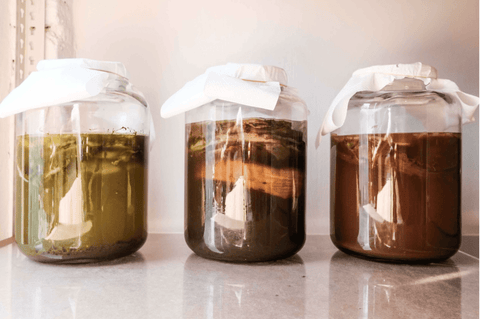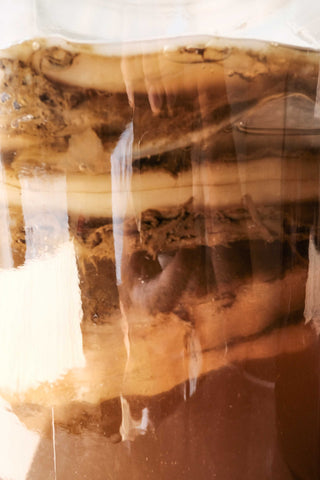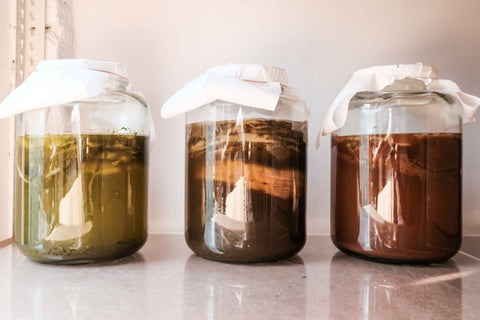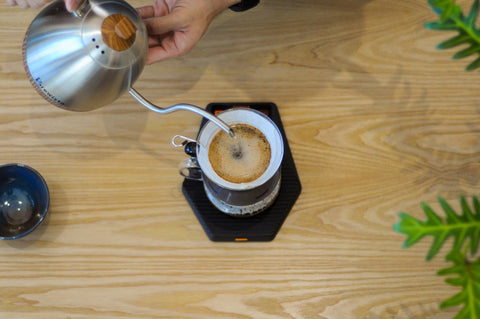
The Beauty of Fermentation: Kombucha
by Daeng. S, edited by Foci Collective
Over the years Kombucha has been the talk of the town. This sought after bubbly, sweet-and-sour beverage has been making waves all over the globe but the origins of it are somewhat murky. Dating back to 200 BCE, the fermented tea, “Cha”, was believed to have originated from Northeastern China. Down the road of this beverage’s long history, a fabled Korean physician named “Kombu” was responsible for introducing the miracle elixir to Japan. Making a name for itself as “Kombucha”, it continued its journey to Europe in the early 20th century, in Russia and Germany, and eventually, the whole world.

To make Kombucha is no rocket science, as it is customarily made from fermented tea. Contrary to popular belief, Kombucha can be made using almost any liquid with sufficient sugar for the fermentation process. As a product of fermentation, the key takeaway from the making of the naturally carbonated drink is SCOBY, which stands for:
Symbiotic Culture Of Bacteria and Yeast.
In simpler terms, bacteria and yeast work in unison to produce the wholesome beverage that lives up to its hype.
The Science Behind Kombucha

To go into the specifics of the fermentation process, yeast consumes sugar to produce ethanol and carbon dioxide, while the cohabitant Acetic Acid Bacteria plays its part in oxidizing the ethanol into acetic acid with the surrounding oxygen. Albeit the process decreases the alcohol percentage, the Kombucha is not completely alcohol-free. With that said, The ABV (alcohol by volume) content of Kombucha typically ranges from 0.5% to 1%, relatively lower than common alcoholic drinks.
Derived from sustained fermentation, Kombucha is an ever-evolving beverage. In other words, the sugars are constantly changing from one form to another by the yeast and bacteria until it is depleted. Ergo, Kombucha develops a distinctive sourness over time, making timing a crucial aspect when consuming the beverage to achieve the perfect balance of taste, with the optimum amount of residual sweetness to be paired with the lively acidity.

With all the sciency terms and processes put aside, the ultimate question still stands:
“What’s so good about Kombucha?”
To enlighten you on the benefits of this miracle beverage, Kombucha aids in weight loss, improving digestion, bone health, and inflammation. Despite the fact that these claims have no scientific backup, published studies have stated the multiple acids (e.g. glucuronic, acetic, folic acids) and vitamin B produced by the fermentation process provides potential benefits to improve our overall health.
In addition, the living organisms found in Kombucha have shown promising results based on research. For instance, it has shown antimicrobial benefits, liver and gastrointestinal functions, immune stimulation, detoxification, antioxidant, anti-tumor properties, health prophylactic and recovery effects through immune stimulation. Among other things, it also inhibits the development and progression of cancer, cardiovascular disease, diabetes, and neurodegenerative diseases. Last but not least, it maintains the normal functions of our central nervous system.

Much like the progressive nature of Kombucha, we, at Forest Cloud are always on our feet to explore and innovate our beverages to serve you better in many ways. That being said, we seek to reap the benefits of fermentation to present a line of health-conscious concoctions. As a cutting-edge beverage company, we look at Kombucha as a means to further push the boundaries of our raw materials with the mesmerizing process of fermentation. Purely made from Coffee, Cocoa, Matcha, and Hojicha, our Kombucha has a range of unprecedented flavours made from the wonders of fermentation. A case in point, our Matcha Kombucha has produced fruit notes akin to green apples, and even passion fruit. Intrigued? Come over and experience it first hand!



